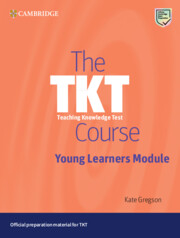Book contents
- Frontmatter
- Acknowledgements
- Contents
- Introduction
- Part 1 Knowledge of young learners and principles of teaching English to young learners
- Part 2 Planning and preparing young learner lessons
- Part 3 Teaching young learners
- Part 4 Assessing young learner learning in the classroom
- Follow-up activities: Answer keys and commentaries
- List of terms found in the TKT Glossary
- Glossary of TKT: Young Learners terms
- Test tips for TKT: Young Learners
- Teaching knowledge test young learners: Practice test
- Sample test answer sheet for TKT: YL practice test
- Answer key for TKT: YL practice test
Part 1 - Knowledge of young learners and principles of teaching English to young learners
Published online by Cambridge University Press: 14 March 2024
- Frontmatter
- Acknowledgements
- Contents
- Introduction
- Part 1 Knowledge of young learners and principles of teaching English to young learners
- Part 2 Planning and preparing young learner lessons
- Part 3 Teaching young learners
- Part 4 Assessing young learner learning in the classroom
- Follow-up activities: Answer keys and commentaries
- List of terms found in the TKT Glossary
- Glossary of TKT: Young Learners terms
- Test tips for TKT: Young Learners
- Teaching knowledge test young learners: Practice test
- Sample test answer sheet for TKT: YL practice test
- Answer key for TKT: YL practice test
Summary
Introduction to Part 1
In Part 1, you will deepen your understanding of the characteristics of children aged 6–12 as learners, and consider the implications of this for teaching English to these learners. This part of The TKT Course: Young Learner Module will help you extend your knowledge and skills in preparation for the first part of the TKT: YL module test, namely, Knowledge of young learners and principles of teaching English to young learners. You can find more information in the TKT: YL syllabus in the module handbook, which is available online.
Specifically, in Unit 1, you will find out more about what makes young learners of English different from older learners, first by looking at the developmental benefits of learning English, and then by looking at ways we can enhance their language learning so that they can have these benefits. Finally, we look at classroom activities which are suitable for young learners, based on their characteristics.
Units 2, 3 and 4 will each introduce one of three kinds of strategy that children can develop through language learning: learning strategies, cognitive strategies and communication strategies. Each unit will explain what these strategies are, consider why they are important, and look at ways to develop and practise them in the English language classroom.
Each unit also includes suggested reader activities for extension, reflection and investigation into your practice. These activities will help you consolidate your understanding and relate your learning to your own classroom context. A range of activities are suggested in each unit, and you can find a sample TKT: YL practice test section on the unit topic at the end of each one. You could use your TKT: YL PD Journal to keep your notes and reflections for the questions and activities organised.
Before you begin, look at the can-do statements. Evaluate your own understanding and skills for each one. After completing Part 1, return to these and re-assess yourself. From that, you can develop an action plan so that you can continue to focus on any particular areas you feel you still need or want to develop.
- Type
- Chapter
- Information
- The TKT Course Young Learners Module , pp. 6 - 7Publisher: Cambridge University PressPrint publication year: 2024



